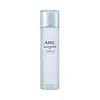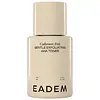What's inside
What's inside
 Key Ingredients
Key Ingredients

 Benefits
Benefits

 Concerns
Concerns

 Ingredients Side-by-side
Ingredients Side-by-side

Water
Skin ConditioningDipropylene Glycol
HumectantGlycerin
HumectantBetaine
Humectant1,2-Hexanediol
Skin ConditioningNiacinamide
SmoothingPropanediol
SolventAlcohol Denat.
AntimicrobialGlycereth-26
HumectantButylene Glycol
HumectantEnteromorpha Compressa Extract
Skin ProtectingCodium Tomentosum Extract
Skin ProtectingUndaria Pinnatifida Extract
Skin ConditioningGlycereth-25 PCA Isostearate
EmulsifyingArtemisia Princeps Leaf Extract
Skin ConditioningEthylhexylglycerin
Skin ConditioningMaris Aqua
HumectantParfum
MaskingAdenosine
Skin ConditioningAmmonium Acryloyldimethyltaurate/Vp Copolymer
Disodium EDTA
Biosaccharide Gum-1
HumectantSodium Hyaluronate
HumectantRosa Damascena Flower Water
MaskingBetula Alba Juice
AstringentCaprylic/Capric Triglyceride
MaskingHydrogenated Lecithin
EmulsifyingButyrospermum Parkii Butter
Skin ConditioningCamellia Sinensis Leaf Water
MaskingCeramide NP
Skin ConditioningCaprylyl Glycol
EmollientAnthemis Nobilis Flower Water
MaskingDaucus Carota Sativa Root Water
MaskingChamaecyparis Obtusa Water
MaskingThuja Orientalis Extract
AntimicrobialCitrus Unshiu Peel Extract
MaskingVitis Vinifera Fruit Water
Skin ConditioningOryza Sativa Bran Water
MaskingPrunus Mume Fruit Water
HumectantCeramide Ns
Skin ConditioningCeramide As
Skin ConditioningCeramide AP
Skin ConditioningCholesterol
EmollientEucalyptus Globulus Leaf Extract
PerfumingPhytosphingosine
Skin ConditioningAsiatic Acid
Skin ConditioningMadecassic Acid
Skin ConditioningAsiaticoside
AntioxidantCeramide EOP
Skin ConditioningWater, Dipropylene Glycol, Glycerin, Betaine, 1,2-Hexanediol, Niacinamide, Propanediol, Alcohol Denat., Glycereth-26, Butylene Glycol, Enteromorpha Compressa Extract, Codium Tomentosum Extract, Undaria Pinnatifida Extract, Glycereth-25 PCA Isostearate, Artemisia Princeps Leaf Extract, Ethylhexylglycerin, Maris Aqua, Parfum, Adenosine, Ammonium Acryloyldimethyltaurate/Vp Copolymer, Disodium EDTA, Biosaccharide Gum-1, Sodium Hyaluronate, Rosa Damascena Flower Water, Betula Alba Juice, Caprylic/Capric Triglyceride, Hydrogenated Lecithin, Butyrospermum Parkii Butter, Camellia Sinensis Leaf Water, Ceramide NP, Caprylyl Glycol, Anthemis Nobilis Flower Water, Daucus Carota Sativa Root Water, Chamaecyparis Obtusa Water, Thuja Orientalis Extract, Citrus Unshiu Peel Extract, Vitis Vinifera Fruit Water, Oryza Sativa Bran Water, Prunus Mume Fruit Water, Ceramide Ns, Ceramide As, Ceramide AP, Cholesterol, Eucalyptus Globulus Leaf Extract, Phytosphingosine, Asiatic Acid, Madecassic Acid, Asiaticoside, Ceramide EOP
Water
Skin ConditioningPropanediol
SolventGluconolactone
Skin ConditioningCaprylic/Capric Triglyceride
MaskingLactic Acid
BufferingTranexamic Acid
AstringentSodium Hydroxide
BufferingPrunus Amygdalus Dulcis Oil
Skin ConditioningBetaine
HumectantColloidal Oatmeal
AbsorbentOryza Sativa Bran Water
MaskingTocopherol
AntioxidantSphingomonas Ferment Extract
Skin ConditioningPanthenol
Skin ConditioningLeuconostoc/Radish Root Ferment Filtrate
AntimicrobialAzelaic Acid
BufferingHydrogenated Lecithin
EmulsifyingSodium Citrate
BufferingEthylhexylglycerin
Skin ConditioningPolyglyceryl-10 Stearate
Skin ConditioningCitric Acid
BufferingTrisodium Ethylenediamine Disuccinate
Phenoxyethanol
PreservativeWater, Propanediol, Gluconolactone, Caprylic/Capric Triglyceride, Lactic Acid, Tranexamic Acid, Sodium Hydroxide, Prunus Amygdalus Dulcis Oil, Betaine, Colloidal Oatmeal, Oryza Sativa Bran Water, Tocopherol, Sphingomonas Ferment Extract, Panthenol, Leuconostoc/Radish Root Ferment Filtrate, Azelaic Acid, Hydrogenated Lecithin, Sodium Citrate, Ethylhexylglycerin, Polyglyceryl-10 Stearate, Citric Acid, Trisodium Ethylenediamine Disuccinate, Phenoxyethanol
 Reviews
Reviews

Ingredients Explained
These ingredients are found in both products.
Ingredients higher up in an ingredient list are typically present in a larger amount.
Betaine is a common humectant (a substance that promotes retention of moisture). It's known to be gentle on the skin and can help balance hydration.
This ingredient is best for improving hydration and soothing irritated skin. Studies also show it helps even out skin tone.
Fun fact: Betaine is naturally created in the skin and body. The kind found within cosmetic products can be either plant-derived or synthetic.
Another name for betaine is trimethylglycine.
Learn more about BetaineThis ingredient is an emollient, solvent, and texture enhancer. It is considered a skin-softener by helping the skin prevent moisture loss.
It helps thicken a product's formula and makes it easier to spread by dissolving clumping compounds.
Caprylic Triglyceride is made by combining glycerin with coconut oil, forming a clear liquid.
While there is an assumption Caprylic Triglyceride can clog pores due to it being derived from coconut oil, there is no research supporting this.
Learn more about Caprylic/Capric TriglycerideEthylhexylglycerin (we can't pronounce this either) is commonly used as a preservative and skin softener. It is derived from glyceryl.
You might see Ethylhexylglycerin often paired with other preservatives such as phenoxyethanol. Ethylhexylglycerin has been found to increase the effectiveness of these other preservatives.
Hydrogenated Lecithin is created from the hydrogenation of lecithin (a group of phospholipids). Hydrogenation is a chemical reaction between hydrogen and another element.
This ingredient is an emollient and emulsifier. As an emollient, it helps soften skin by trapping moisture within. As an emulsifier, it prevents oil and water ingredients from separating.
Oryza Sativa Bran Water comes from the outer layer of a rice kernel. It is a byproduct of milling rice, or the operation to produce a whole grain rice product.
According to INCI, this ingredient is used for masking and perfuming.
Masking ingredients are used to obscure or block properties of other ingredients. They are commonly used to block the scent of a product.
Peruming ingredients help give products a scent and can be natural or synthetically created.
Learn more about Oryza Sativa Bran WaterPropanediol is an all-star ingredient. It softens, hydrates, and smooths the skin.
It’s often used to:
Propanediol is not likely to cause sensitivity and considered safe to use. It is derived from corn or petroleum with a clear color and no scent.
Learn more about PropanediolWater. It's the most common cosmetic ingredient of all. You'll usually see it at the top of ingredient lists, meaning that it makes up the largest part of the product.
So why is it so popular? Water most often acts as a solvent - this means that it helps dissolve other ingredients into the formulation.
You'll also recognize water as that liquid we all need to stay alive. If you see this, drink a glass of water. Stay hydrated!
Learn more about Water